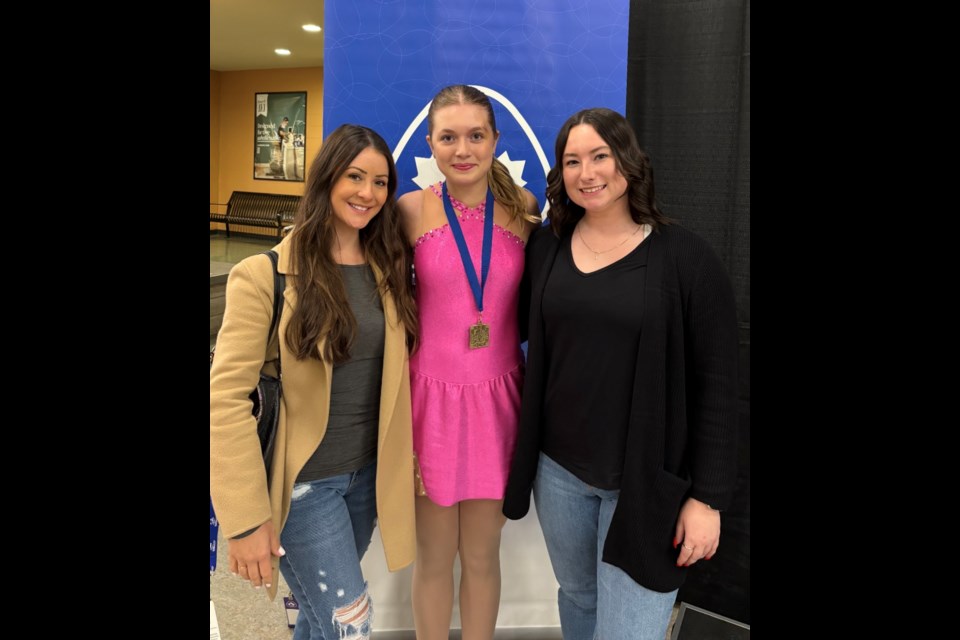The St. Albert Skating Centre (SASC) returned from the prestigious Wild Rose Invitational with a record-breaking performance, taking home an impressive 10 medals across 12 events. Hosted annually by the Alberta Figure Skating Foundation at the Leduc Recreation Centre, the Wild Rose Invitational draws skaters from across Western Canada and serves as a key milestone in the summer training season.
This year’s competition featured skaters of all ages and levels, with some as young as six performing everything from introductory routines to foundational jumps and spins. The four-day event is unique in that it requires skaters to dedicate their entire summer to training, often sacrificing school breaks and family vacations in pursuit of technical and artistic excellence on the ice. For the St. Albert athletes, those sacrifices clearly paid off.
Among the standout performances was Harper MacCauley, who stunned audiences by capturing two gold medals and finishing first overall in her category, just days after suffering a significant injury in training. While working on a new technical element, MacCauley fell on the ice and sustained a deep cut above her eye.
“Harper ended up falling face first on the ice,” said Director Alexa-Marie Arrotta. “It cut her eyebrow open and she ended up having to get five stitches a few days before the competition. We were very fortunate she didn’t have a concussion.” Despite the setback, MacCauley returned to the ice just days later and delivered clean performances that earned her top marks from the judges.
The St. Albert Skating Centre brought 12 skaters to this year’s Wild Rose Invitational, and nearly every one returned home with a podium finish.
“We had 10 out of 12 medals this weekend, which is a huge success for the club. This hasn’t been done before,” Arrotta said.
Their success is a testament not only to the skaters' individual dedication but to the strong leadership and evolving culture of the club. Arrotta, who stepped into the director role one year ago, has helped lead the charge in reimagining the club’s training model.
“We’ve had a lot of internal changes occur. Of course, change can be scary sometimes,” she said. “But we’ve been very fortunate with our success.”
A former national-level skater herself, Arrotta has introduced new technical strategies, brought in outside coaching support from Eastern Canada, and implemented a team coaching model.
“That has been a huge help,” she said. “Part of the kids’ success is due to how well the coaches work together as a team.”
The new approach is helping skaters across all levels build confidence, improve technique, and set their own goals.
“Most of the skaters we’ve had in our club are very self-motivated,” she explained. “They all have their own goals, whether it’s going competitive or staying in the STARSkate stream, and we’re able to tailor to each skater and help them push toward those goals, or even beyond.”
Arrotta emphasized that the club’s strength lies in offering opportunity and support, no matter where a skater is in their journey.
“We want to give every skater the opportunity to have their own success, whatever that may look like.”
Amanda MacCauley, SASC President and mother of Harper, also credited the skaters’ success to the rigorous summer training.
“Our skaters from St. Albert trained all summer long — extensive training typically from about 8 a.m. to 3 p.m. every day,” she said. “They dedicated their entire summer to this sport.”
With the Wild Rose competition typically being their only major summer event, she noted that “our skaters won’t compete again until December,” making August’s results even more meaningful.
With fall programming beginning in September and preparations already underway for SASC to host the STAR Series #2 competition in December, the club is showing no signs of slowing down. MacCauley, who has served as president for three years, says this year’s success is a reflection of long-term commitment.
“We’ve gone through major transitions in the past couple of years, but we’ve had a consistent focus and a consistent vision to ensure we are providing a safe place for our athletes, where they feel supported, loved, and encouraged.”
That environment has created space not just for competitive success but for personal growth.
“It’s really hard not to get emotional when you look around and see all of the personal growth that’s happening,” she added. “The best part is that we’re so cohesive as a club. While it’s an individual sport, everyone is working toward supporting one another. There’s a place and a spot for everybody. This is the whole reason we’re doing this.”
As the 2025–26 season kicks off, one thing is clear: the St. Albert Skating Centre isn’t just building skaters, it’s building community, resilience, and a foundation for lasting success.




